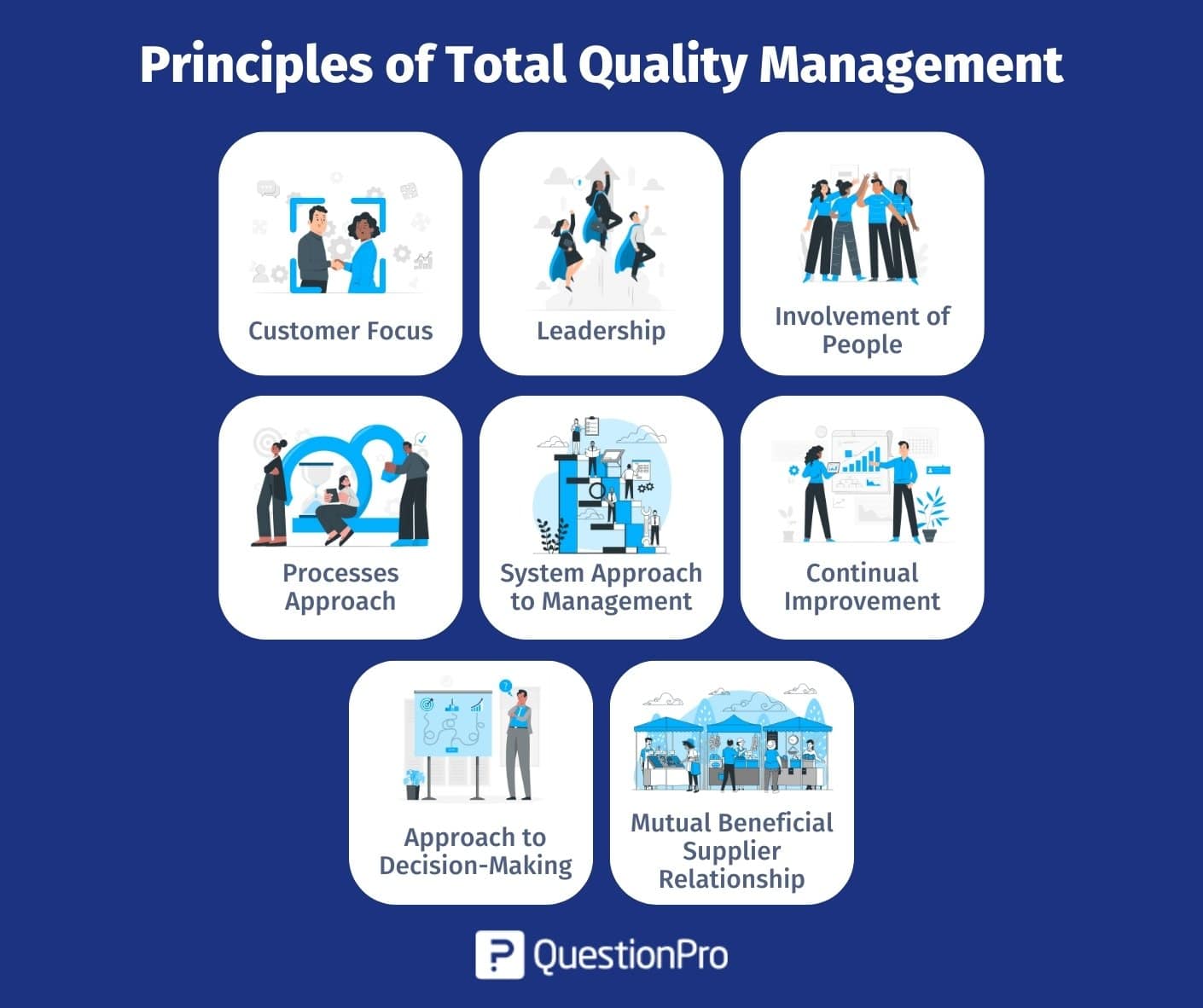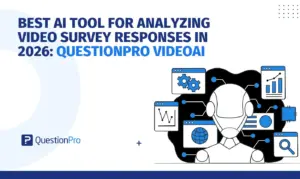
Delivering top-notch goods and services while also increasing customer satisfaction levels is possible with total quality management. It is a popular and effective management approach strategy used in sectors like manufacturing. The leaders outline company objectives and provide training on the process standards to the workforce from various departments as part of the planning process for quality improvement.
TQM assists a company in exceeding customer expectations as well as lowering operational expenses by minimizing resource waste brought on by ineffective procedures. When management and staff stick to the eight principles of total quality management, it gets ingrained in the broader company culture. Learn total quality management, its eight guiding principles, and how it functions across departments.
What is Total Quality Management?
Total Quality Management (TQM) is a management framework based on the idea that a company may achieve long-term success by focusing on quality and customer satisfaction.
Organizations must prioritize continual improvement, according to TQM. Instead of only stressing immediate cash rewards, it focuses on long-term process improvements.
This is an improved method of doing business, and companies may depend on it to stay in operation in today’s quick-paced and fiercely competitive market. It needs management to upgrade and alter its behavior, changing its behavior and culture. Three words make up total quality management:
- Total – Whole in it.
- Quality – High-quality goods and services.
- Management – The method of handling.
Total quality management relies on quantitative methods and human resources to enhance processes, satisfy customers, and gain new requests. This is a method or art of organizing the whole to accomplish a successful goal. Total quality management calls for a more structured strategy, management strategies, updated efforts, and a toolkit.
LEARN ABOUT: Service Recovery
How to implement total quality management
Implementing Total Quality Management (TQM) involves a comprehensive approach to improving the quality of an organization’s products, services, and processes. TQM is not a one-time project but rather a continuous improvement effort to create a quality and continuous improvement culture. Here are the steps to implement TQM:
Leadership Commitment
TQM must be supported from the top down. Leadership commitment is crucial for successful implementation. Leaders need to communicate the importance of TQM, allocate resources, and actively participate in the process.
Create a TQM Team
Establish a cross-functional team responsible for planning, implementing, and overseeing the TQM initiative. This team should include representatives from various departments and levels of the organization.
Develop a TQM Strategy
Create a clear and well-defined strategy outlining the TQM initiative’s goals, objectives, and desired outcomes. This strategy should align with the organization’s overall mission and vision.
Identify Key Processes
Identify the core processes that impact product or service quality most. These could include design, production, customer service, and more.
Define Metrics and Standards
Develop measurable metrics and quality standards that will be used to assess the effectiveness of TQM efforts. These could include defect rates, customer satisfaction scores, process cycle times, etc.
Training and Education
Provide training to employees on TQM principles, methodologies, and tools. This will ensure that everyone understands their role in the quality improvement process.
Continuous Improvement Culture
Foster a culture of continuous improvement where employees are encouraged to identify and address quality issues, suggest improvements, and participate in problem-solving.
Supplier Relationships
Extend the principles of TQM to your suppliers. Collaborate closely with suppliers to ensure the quality of incoming materials and components.
Quality Circles
Form quality circles or teams that focus on specific quality issues. These teams should meet regularly to discuss problems, brainstorm solutions, and implement improvements.
Data-Driven Decision Making
Base decisions on data and analysis rather than assumptions. Collect and analyze quality and customer feedback and process performance data.
Communication
Maintain open and transparent communication channels throughout the organization. Share successes, challenges, and improvements to keep everyone informed and engaged.
Benchmarking
Compare your organization’s processes and performance against industry leaders or best practices. Identify areas where you can learn and improve.
Regular Review
Periodically review the progress of your TQM initiative. Assess whether the goals are being met, and make necessary adjustments to the strategy and implementation.
Principles of total quality management
As with most management systems and practices, implementation and success will differ from company to company. Although there isn’t a single method that everyone agrees on, the most popular TQM definition consists of the following eight concepts.

01. Customer focus
Total quality management (TQM) focuses on current and prospective clients. Customers justify product quality. So, the corporation must guarantee that clients believe they bought a quality product if it can meet expectations. Knowing what a client wants is key to exceeding their expectations. Successful firms match goals with customer demands.
02. Leadership
Leadership maintains staff cohesiveness to accomplish interdependent objectives. Leaders may create an atmosphere where people can work successfully toward the organization’s purpose. So, leadership is a TQM concept. Although there are three leadership styles in the sector, democratic leadership performs best.
03. Involvement of people
People at every level contribute to the organization’s revenues. Total staff dedication helps create goods and boost revenue. So, all personnel must be well-trained, devoted, and determined to meet a deadline. In addition, the sector must establish a responsive workplace where every person is driven to do the job right.
Customer satisfaction may be enhanced by employee motivation, engagement, and retention. People’s attention creates productive teams. Cooperation may be vertical, horizontal, or inter-organizational.
04. Processes Approach
The business needs to improve its procedure to produce high-quality output. Therefore, TQM concentrates on the process method to ensure product or service quality. Customer satisfaction is possible with a successful outcome from the procedure approach.
05. System Approach to Management
The methodical implementation of the plan is emphasized by total quality management (TQM). The sector develops a suitable implementation strategy and gathers data while implementing those procedures.
This concept, according to the International Organization for Standardization (ISO), “contributes to the organization’s effectiveness and efficiency in attaining its goals” by “identifying, analyzing, and controlling interconnected activities as a system.”
06. Continual Improvement
Every industry must continuously enhance its processes to satisfy its customers. TQM helps the business track the system’s ongoing development to improve the industry’s service and goods. Continual improvement, the most important of the eight TQM principles, helps the business gain a competitive edge. The most important principle is also this one.
07. Factual Approach to Decision-Making
Another critical component of TQM is the fact-based strategic and systematic approach to decision-making. Making choices in light of data-based knowledge is made simpler. It is possible to satisfy customers by making decisions supported by facts. This concept employs real data collection and analysis to create judgments that would advance the organization.
08. Mutual Beneficial Supplier Relationship
Whole quality management systems focus on establishing cooperative relationships with suppliers. The word “reciprocity” is another. Although their roles are interconnected, each department is given specific tasks to complete.
The company uses flowcharts and visual tools to understand total employee involvement and performance better. It aids in achieving a common objective for all divisions. Total quality management (TQM) is difficult to execute since it requires a cultural transformation. Thus, the organization must do it carefully.
LEARN ABOUT: Client Management
Total quality management examples
Let’s take a closer look at a few well-known TQM examples.
Healthcare Organization
All hospitals in our society are attempting to increase earnings. TQM is essential for healthcare system improvement. Globally, public and commercial healthcare institutions must increase TQM.
Total quality management principles minimize costs, improve efficiency, and provide high-quality treatment to patients. Customer satisfaction is the most crucial issue; in healthcare, clients may be vital in many ways. A healthcare company must research all areas of profit; only then can both customers and companies benefit from a significant market share.
Multinational Companies
TQM helps MNCs sustain profitability. MNCs employ a great team to look at their graph and implement growth methods. Management keeps TQM in mind and moves quickly to benefit from new technologies.
TQM helps track the company’s growth or decline. The organization cares for workers and consumers; discussions are broad so that every subject can be addressed, and team members share responsibilities. Human resources are confidential; the organization listens to clients’ worries, inquires, and notes what went wrong.
Developing Economies
TQM is used internationally to maximize project revenues. Large companies use it to expand their economies.
After WWII, Japan adopted TQM. Every management has to withstand the Japanese economic recovery. In a competitive setting, managers work rapidly to decrease costs, speed up development and deliveries, and please consumers.
The Japanese are responsive to quality because of their traditional quality and attention to detail. Japan only acquired food because it sold cheap, high-quality items throughout its survival years.
Quality helped the Japanese collect food and supplies throughout their survival years.
The US economy relies on imported items and technology to compete with foreign firms. US corporations use total quality management tools to balance their products, where quality is crucial.
Construction Industry
Construction is an innovative but one-time process, so it is recognized that it is costly and labor-intensive to duplicate a structure (or similar).
TQM may reduce costs, boost productivity, and track efforts when performance is improved. The satisfaction levels of the designer, builder, and homeowners are used in the building business to gauge quality.
Conclusion
Total quality management promotes customer satisfaction by ensuring the regular supply of high-quality goods or services. These Total Quality Management ideas won’t be successfully implemented overnight. Since TQM often involves a significant culture shift, you may wish to adopt these changes gradually to mitigate the effect.
Do you have any worries or inquiries about total quality management? Use the contact form to get in touch with us at Questionpro. We’re looking forward to your call! As an alternative, you may immediately schedule a free demo.







